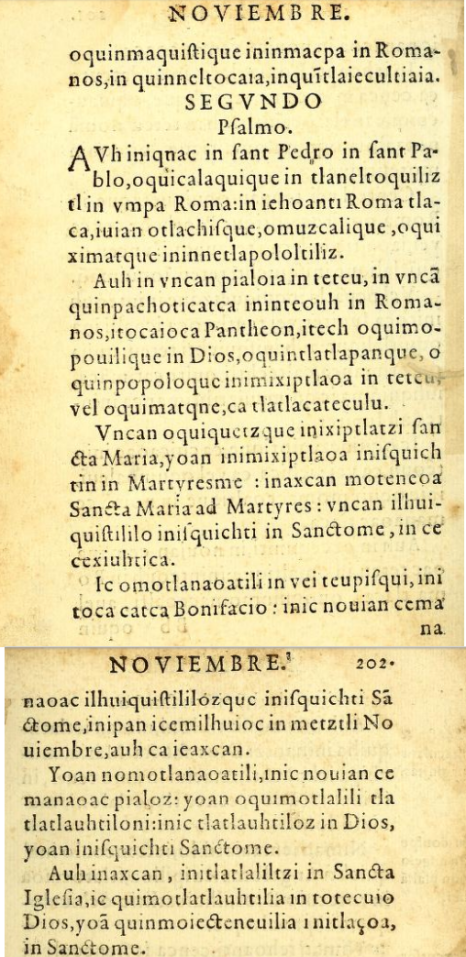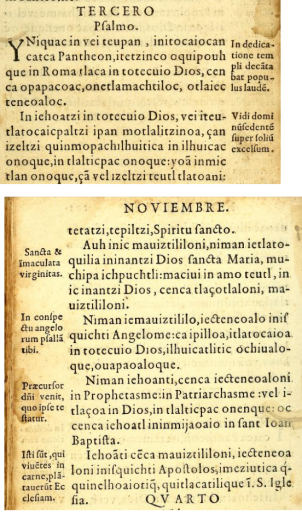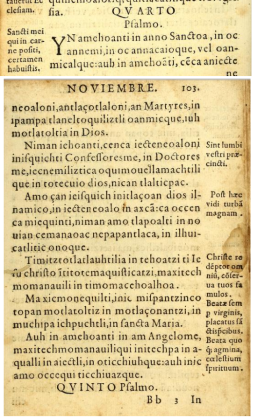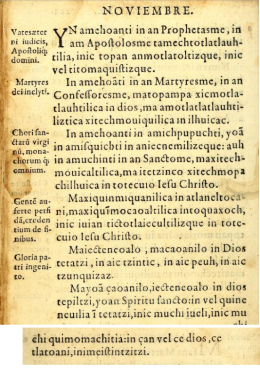 FIRST PSALM
FIRST PSALM
In āxcān pàpāqui, motlamachtia in tonāntzin Sancta Iglesia, inic quinmolhuiquīxtilīlia in ītlazòhuān Dios, in Sanctomê, ic pàpācōhua in nōhuiyān cemānāhuac.
Today our mother Holy Church rejoices and is glad, as she celebrates the feast of the beloved of God, the saints, at which the whole world rejoices.
In yèhuāntin Romatlācâ, in oc tlateōtōcâ, cencâ miyaccān ōtēpēuhquê, ōquiyāōcuīquê in tlàtòcāyōtl: auh in tēteô nōhuiyān nōtzaloyâ, ōquimmomāltìquê, ō nō quimmoteōtiquê.
The people of Rome, when they were still pagan, conquered very many lands and seized kingship through war, and they would call upon the gods of every land — they had taken them as captives; they honored them also as gods.
Centetl huēi teōpan ōquiquetzquê in Roma, ōquitōcāyōtìquê Pantheon: cencâ huēi, yahualtic, auh zan tetzopqui: oncān ōquintlālìquê in īxquichtin tēteô, in ōquimānquê.
They built a great temple at Rome, and they named it the Pantheon. It was very large, round, and was vaulted: there they placed all the gods that they had conquered.
Huel nepantlà in quiquetzquê in īnteōuh in ītōcā Iupiter, huēi teōtlàtòcāicpalli īpan ōquitlālìquê: auh in īxquichtin tēteô, quiyahualòtimancâ, caltechtli quitīocatimancâ, iuhquin mā ic quimahuiztilìtimancâ in īnteōuh Iupiter.
Right in the middle, they set up their god whose name was Jupiter; they put a great sacred throne there for him. And all the gods spread out around him, they spread along the walls, as if they were spreading out in fear of their god Jupiter.
Ic ōquinēzcāyōtìquê, ca chicāhuac in īnteōuh, ca huēi: yèīca ca huel ōquinpalēhuî, inic ōquimmomācehualtìquê in nōhuiyān cemānāhuac tlācâ.
By this they signified that their god was strong, that he was great; for he had helped them make the people of the whole world their subjects.
Auh in occequintin, in nōhuiyān cemānāhuac tēteô, in ōmāltiquê, in īnteōuh in Romatlācâ, ō nō quimmomācehualtî, àhuel ōquimmāquīxtìquê in īmmācpa in Romanos, in quinneltōcayâ, in quintlayecōltiāyâ.
But the others, the gods of all the earth, were captives; the god of the Roman people had likewise made the gods his subjects, and they had been unable to save those who believed in them, those who served them, from the hands of the Romans.
 SECOND PSALM
SECOND PSALM
Auh in ìcuāc in Sant Pedro, in Sant Pablo, ōquicalaquìquê in tlaneltōquiliztli in ōmpa Roma: in yèhuāntin Romatlācâ, īhuiyān ōtlachixquê, ōmozcalìquê, ōquīximatquêin īnnetlapolōltīliz.
But when St. Peter and St. Paul brought the faith to Rome, the Romans listened to them in peace, they were brought to life, they acknowledged their sins.
Auh in oncān piyalōyâ in tēteô, in oncān quinpachòticatca in īnteōuh in Romanos, ītōcāyōcān Pantheon, ītech ōquimopōhuilìquê in Dios, ōquintlàtlapānquê, ōquinipòpolòquê in īmīxiptlàhuān in tēteô, huel ōquimatquê, ca tlātlācatecolô.
And they dedicated to God the gods that were there, that were dominated by the god of the Romans in the place called Pantheon; they smashed, they destroyed the images* of the gods, for they knew that they were demons.
* Here and in the next lines “image” is ixiptla, the word for those who impersonated the gods at Aztec festivals.
Oncān ōquiquezquê in īxiptlàtzin Sancta Maria, īhuān in īmīxiptlàhuān in īxquichtin in Martyresmê: in āxcān motēnēhua Sancta Maria ad Martyres: oncān ilhuiquīxtilīlô in īxquichtin in Sanctosmê, in cecēxiuhtica.
There they erected an image of St. Mary, and images of all the martyrs. Today it is called Sancta Maria ad Martyres; the feast of All Saints is celebrated there every year.
Ic ōmotlanāhuatilî in huēi teōpixqui, in ītōcā catca Bonifacio: inic nōhuiyān cemānāhuac ilhuiquīxtilīlōzquê in īxquichtin Sanctomê, in īpan īcemilhuiyōc in mētztli Noviembre, auh ca ye āxcān.
For a great bishop, whose name was Boniface, declared that all over the world the feast of All Saints should be celebrated on the First of November, and so it is today.
Īhuān nō motlanāhuatilî, inic nōhuiyān cemānāhuac piyalōz: īhuān ōquimotlālīlî tlatlātlauhtīlōni: inic tlatlāuhtīlōz in Dios, īhuān in īxquichtin Sanctomê.
And he also declared that it should be observed all over the world, and he composed a prayer to God and to all the Saints.
Auh in āxcān, in ītlatlālīltzin, in Sancta Iglesia ic quimotlātlauhtīlia in Totēucyo Dios, īhuān quimmoyēctēnēhuilia in ītlazòhuān, in Sanctomê.
And today, by his command, Holy Church prays to the Lord our God, and praises his beloved, the saints.
 THIRD PSALM
THIRD PSALM
In ìcuāc in huēi teōpan, in ītōcāyōcān catca Pantheon, ītechtzinco ōquipōuhquê in Romatlācâ in Totēucyo Dios, cencâ ōpàpācōhuac, ōnetlamachtīlōc, ōtlayēctēnēhualōc.
When the Roman people had dedicated the great temple that was called Pantheon to the Lord our God, there was much rejoicing, there was gladness, there was praise.
In yèhuāntzin in Totēucyo Dios, huēi īteōtlàtòcāicpaltzin īpan motlālìtzinoa, zan īceltzin quinmopachilhuìtica in ilhuicac onoquê, in tlālticpac onoquê: īhuān in mictlān onoquê, zan huel īceltzin Teōtl tlàtoāni: Tētàtzin, Tēpiltzin, Spiritu Sancto.
It is he, the Lord our God, who sits on the great sacred throne. He alone dominates those who are in in heaven, those who are on earth, and those who are in hell; God alone is king: the Father, the Son, and the Holy Spirit.
Auh inic mahuiztīlīlōni, niman ye tlatoquilia in īnāntzin Dios Sancta Maria, mochipa ichpōchtli, mācihui in àmo teōtl, inic īnāntzin Dios, cencâ tlazòtlalōni, mahuiztīlīlōni.
And next in order to be honored is St. Mary, the Mother of God, ever-virgin. Although she is not a god, since she is the Mother of God she is very lovable, very worthy of honor.
Niman ye mahuiztīlīlô, yēctēnēhualô in īxquichtin Angelomê: ca īpilhuān ītlàtòcāyōhuān in Totēucyo Dios, ilhuicatl ìltic ōchīhualōquê, ōhuapāhualōquê.
Next all the angels are honored, are praised, for they are the princes of the kingdom of the Lord our God; they were made, they were brought up, in heaven.
Niman yèhuāntin, cencâ yēctēnēhualōnî in Prophetasmê, in Patriarchasmê: huel ītlazòhuān in Dios, in tlālticpac ōnenquê: oc cencâ yèhuātl in īmmiyāhuayo in Sant Ioan Baptista.
Next are the Prophets and the Patriarchs, very worthy of praise: they are God’s beloved who have lived on earth, and foremost among them is St. John the Baptist.
Yèhuāntin cencâ mahuiztīlīlōnî, yēctēnēhualōnî in īxquichtin Apostolos, īmezzōtica quinelhuayōtìquê, quitlācatilìquê in Sancta Iglesia.
All the Apostles are very worthy of honor, of praise: who founded, who gave birth to Holy Church through their blood.
 FOURTH PSALM
FOURTH PSALM
In amèhuāntin in annoSanctohuān, in oc annemî, in oc annacayòquê, huel ōammìcalquê: auh in amèhuāntin, cencâ anyēctēnēhualōnî, anMartyres, in īpampa tlaneltoquiliztli ōanmicquê, iuh motlàtōltia in Dios.
You are my saints who are still living, who still have flesh: you have fought well. And you are martyrs, highly worthy of praise, who died for the faith, as God commanded.
Niman yèhuāntin, cencâ yēctēnēhualōnî in īxquichtin Confessoresmê, in Doctoresmê, yēcnemiliztica ōquimohuellamachtīlìquê in Totēucyo Dios, nicān tlālticpac.
Next, highly worthy of praise, are all the confessors and doctors, who by living rightly were well-pleasing to the Lord our God here on earth.
Àmo zan ye īxquich in ītlazòhuān Dios ilnāmicô, in yēctēnēhualô in āxcān: ca oc cencâ miyaquintin, niman àmo tlapōhualtin in nōhuiyān cemānāhuac nepāpan tlācâ, in ilhuicatl ìtic onoquê.
And those are not all the beloved of God who are remembered, who are praised, today: for there are many more, people of all kinds, without number, all over the world, who are in heaven.
Timitztotlātlauhtīliâ in tèhuāntzin tiJesu Christo in titotēmāquīxtìcātzin; mā xitēchmomānahuīli in timomācehualhuān.
We pray to you, Jesus Christ our savior; defend us who are your subjects.
Mā xicmonequilti, inic mīxpantzinco topan motlàtōltīz in motlazònāntzin, in mochipa ichpōchtli, in Sancta Maria.
Grant that in your presence your beloved mother, the ever-virgin St. Mary, might intercede on our behalf.
Auh in amèhuāntin in amAngelomê, mā xitēchmomānahuīlīquî in ītechpa in àcualli in àyēctli, in ōticchīuhquê: auh inic àmo occequin ticchīhuazquê.
And you angels, come to defend us from the evil, the wrong that we have done, that we may not do it again.
 FIFTH PSALM
FIFTH PSALM
In amèhuāntin in anProphetasmê, in amApostolosmê tamēchtotlātlauhtīliâ, inic topan anmotlàtōltīzque, inic huel titomāquīxtīzquê.
To you, prophets and Apostles, we pray that you intercede for us that we may be saved.
In amèhuāntin in anMartyresmê, in anConfessoresmê, mā topampa xicmotlātlauhtīlīcān in Dios, mā amotlatlātlauhtiliztica xitēchmohuīquilīcān in ilhuicac.
O you martyrs and confessors, pray to God for us; bring us to heaven by your prayers.
In amèhuāntin in amichpōpōchtin, īhuān in amīxquichtin in anyēcnēmilizèquê: auh in ammochintin in anSanctomê, mā xitēchmohuīcaltīlīcān, mā ītechtzinco xitēchmopachilhuīcān in Totēucyo Jesu Christo.
O you virgins and all you who have lived worthy lives, and all you saints, accompany us, incline towards us for the sake of our Lord Jesus Christ.
Mā xiquimmìcuanīlīcān in àtlaneltocanî, mā xiquimmocāhualtīlīcān in tocuāxōch, inic īhuiyān tictotlayecōltīlīzquê in Totēucyo Jesu Christo.
Remove the unbelievers, cause them to leave our borders, so that we may serve our Lord Jesus Christ in peace.
Mā yēctēnēhualo, mā cahuānilo in Dios Tētàtzin, in aic tzīntic, in aic pēuh, in aic tzonquīzaz.
May God the Father be praised, be glorified, who is without start, without beginning, without end.
Mā īhuān cahuānilo, yēctēnēhualo in Dios Tēpiltzin, īhuān Spiritu Sancto: in huel quinēnehuilia in Tētàtzin, inic mocha īhueli, inic mochi quimomachītia, in zan huel cē Dios, cē tlàtoāni, in īmēyixtintzitzin.
May God the Son and the Holy Spirit be glorified, be praised along with him — they are equal to the Father, they are all-powerful, all knowing: the three of them are one God, one king.


















